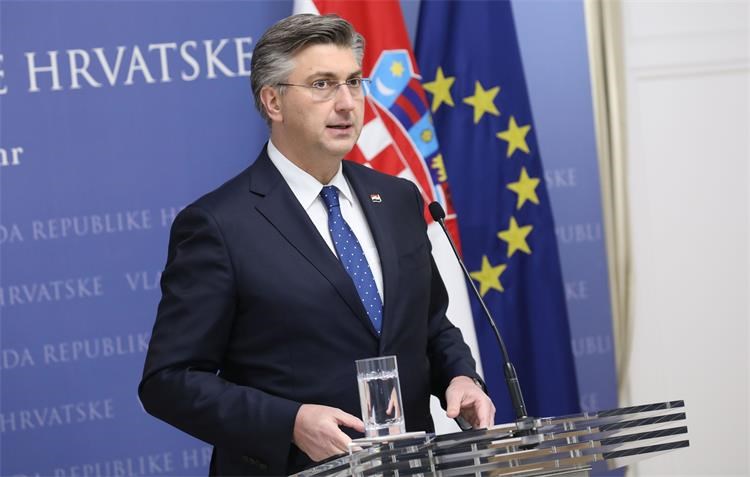


The measures are aimed at further alleviating the impact of the crisis caused by the coronavirus pandemic, the worst global, European, and Croatian crisis in the last few years, Plenkovic said at a press conference after a session of the inner cabinet, which discussed the new set of measures designed to prop up the economy.
"We have no doubt whatsoever that this is the most severe crisis since the (1991-1995) Homeland War, and I believe that we will, after a while, remember March 2020 as the most difficult month we have lived through in this millennium," the prime minister noted.
He repeated that "we are at war with the coronavirus, with panic and with the socioeconomic impact of the pandemic on jobs, companies and the economy as a whole." He said the situation was grave, adding that the biggest problem was uncertainty, because no one could estimate how long the situation would last.
"Following the developments, and starting from the assumption that we cannot with any certainty foresee how long the crisis will last, we will present another package of measures," Plenkovic announced, adding that the government would firmly support Croatian workers and the economy.
Plenkovic announced that the government would propose increasing the amount of the net minimum wage per employee from HRK 3,250 to 4,000 in March, April, and May as part of the existing minimum wage payment scheme used by 65,000 companies for 400,000 workers.
Also, the state will cover contributions, which amounts to around HRK 1,460 for a net wage of HRK 4,000. In total, the state will pay HRK 5,460 per employee. In April, May, and March, the state will fund the measure with HRK 8.5 billion, Plenkovic stated, noting that employers are only eligible to apply if they keep their employees.
The second measure is aimed at companies that either cannot do business, or it is very difficult for them to do business. They will be partially or completely exempt from their tax liabilities for April, May, and July, namely from paying profit tax, income tax and contributions.
The companies that have seen their revenues fall by 20% to 50% will be entitled to a deferral and payment in instalments for 24 months without interest. The companies whose revenue has decreased by less than 20% are stable enough to weather the crisis, the prime minister said.
"However, the companies that generate a turnover of less than HRK 7.5 million, which is 93% of all companies in Croatia, and whose revenue has decreased by more than 50%, will be completely exempt from their tax liabilities, profit tax, income tax and contributions," Plenkovic said.
The companies that generate more than HRK 7.5 million, the 7% of big companies, will be exempt from their tax liabilities in proportion to the decrease in their revenue in April, May, and July. If their revenue has decreased by 20% to 50%, they are entitled to a deferral and interest-free payment in instalments, those whose revenue has decreased by 50% to 100% will pay proportionately, and if their revenue has decreased by 75%, they will only pay 25% of their tax liabilities.
The third measure applies to VAT payments. Plenkovic said that it would be possible to defer such payments until the billing of invoices issued, as is now the case with small businesses.
The deadline for the submission of financial statements for 2019 is extended until 30 June this year and businesses are exempt from paying the Financial Agency a fee for the publication of financial statements.
The prime minister said that the government would be as frugal as possible and would execute only the necessary expenditures.
In the agriculture sector, public procurement procedures will benefit domestic producers, the plan being that at least 60 percent of agricultural and food products are made in Croatia. Emergency aid will also be extended to small dairies through purchases of all of their surpluses.
Relevant laws will be amended to help the tourism sector.
Plenkovic announced talks with the social partners, notably the trade unions, to see how to make further savings given the current situation. He said that there was enough money for March wages and pensions, which will be paid in April.
"We will discuss wages and pensions for April, which are paid in May, and how to respond to these challenges," the PM said.
He said that sources of financing were being sought in coordination with the central bank, adding that he was confident that they would be found despite all the obstacles. "We must find the necessary funding to ensure the functioning of the state and all its segments."
The government adopted the first set of measures to help the economy hit by the fallout of the coronavirus epidemic at its session on 17 March.The package, worth HRK 30 billion (€4bn), included 63 measures aimed at those that were already feeling or were yet to feel the consequences of the crisis.
The measures included the deferral of income and profit taxes and wage contributions for three months, with the possibility of the time limit being extended for another three months, and 100 percent coverage of the cost of the net minimum wage for the next three months, also with the possibility of extension.
Finance Minister Zdravko Maric said on Tuesday that 52,000 applications for tax deferral had been submitted, while the Ministry of Labour and Pension System told Hina that 65,291 employers had applied for the payment of the minimum wage, covering about 400,000 workers.
Employer associations have described the first set of government measures as insufficient, calling for a write-off, rather than deferral of taxes and contributions, and for exemption from various fees and parafiscal levies.
Text: Hina